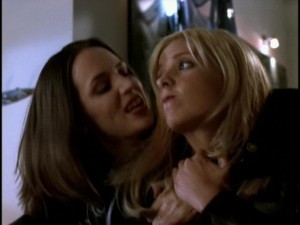Trouble and Conflict
When I teach character, I emphasize that trouble is not conflict. You want your reader worried about the protagonist on the first page, and while trouble–broke, sick, lost, depressed, etc.–is worrisome, it’s not a pressing worry because it’s ongoing and static. She’s going to be just as broke tomorrow as she is today and was yesterday, so there’s nothing immediate about it, the way conflict is immediate, the struggle between two people going on right now, the end of the struggle imminent. Conflict is escalating action, and that’s what drives a story. Movement draws fire interest, movement striving against an opponent draws even more interest. Your protagonist has to solve both trouble and conflict, but she has to solve conflict right now by dealing with somebody who’s opposing her. So you want your protagonist arguing with the landlord about the rent, not staring out the window and thinking about how poor she is.

TROUBLE

CONFLICT
But I have been watching TV in the evenings lately–it’s my drug of choice that keeps me from screaming–and I have noticed something. Trouble is also good, possibly even necessary, because it establishes reader/viewer sympathy. This is something I have not considered before, but I’m pretty much sold on it now: You need both trouble and conflict to start a story.
Take my current obsession-on-film, Life on Mars (UK version). Sam’s an honest, hardworking detective in 2006 who gets hit by a car and wakes up in 1973 and cannot figure out what the hell is going on. As he says in the opening every week, he doesn’t know if he’s dead, in a coma, or time traveling, he just wants to get home. He’s thrown into an unsympathetic squadroom under the charge of a Neanderthal cop who has no problem smacking suspects around and who routinely makes fun of him. And yet Sam does his damnedest to solve the 1973 cases that come his way, all the while trying to get back to the twenty-first century. Solving the cases causes the conflict in his stories, but trying to get home is his undeserved trouble, and it not only adds another layer to his plot, it adds layers to his character.
Or try Buffy the Vampire Slayer; her conflict is fighting vampires and monsters and that’s what powers her plots, but her trouble is trying to be a normal teenage girl and not the Slayer 24/7. Or Charlie on Life, who has conflict with killers every week but whose trouble is that he was brutalized in prison for twelve years and now has to find a way to live again, free on the streets and back at his old job where nobody wants him. Even Ichabod on Sleepy Hollow has trouble in addition to his conflict with the Four Horsemen of the Apocalypse: he’s a man out of time with a witch-wife who keeps showing up in visions from purgatory. Conflict makes story, but trouble makes sympathy for the character.
I came to this realization because another obsession lately is trying to figure out why S.H.I.E.L.D. is so damn bad. I bailed seventeen minutes into the third episode because it was so awful, but I’d give the fourth episode a solid B. The reason hit me at the end when Coulson sends the antagonist, Akela, away, and I thought, No! Keep her! Akela was interesting, Akela was smart, Akela was strong, but mostly Akela was in trouble which nobody on S.H.I.E.L.D. ever is. They’re safe on their big plane with Coulson watching over them, they all know who they are and what they want from life, none of them have any doubts, any worries, any trouble. (Okay, Chip and Dale had that virus problem in the last episode, but I couldn’t get too worked up about it because they weren’t going to kill Dale and also if they’d both fallen out of the plane so Akela could come back, I’d have been happy.) I can live with static happiness in a supporting character (say Felicity on Arrow), but not in main characters, not in the people who are carrying the story.
So my main point still stands: If all you have in your first scene is trouble, if the protagonist is the same person at the end of the scene that she was at the beginning because nothing has happened to push her to change, you need a rewrite for conflict: get that antagonist in there. But if you want your reader to care about your protagonist while she’s watching her struggle, make her (or him) vulnerable through trouble.
Which means I’m changing, “She’s in trouble, but what she needs is conflict,” to “She needs conflict, but some trouble is a good idea, too.” (Yes, it only took me twenty years to figure that out, but the important thing is, I got here.) So what do you think?




